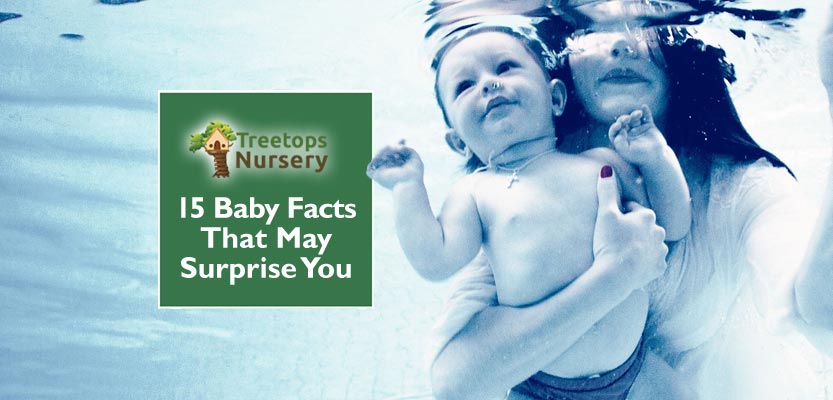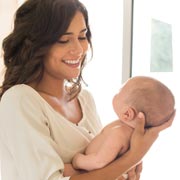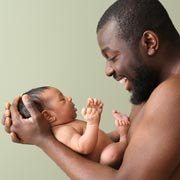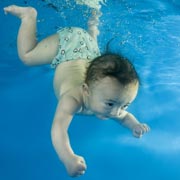
 Today we take a look at some amazing baby facts, many of which may come as a surprise. Human babies are incredible in so many ways, but you may not be aware of just how incredible they really are …
Today we take a look at some amazing baby facts, many of which may come as a surprise. Human babies are incredible in so many ways, but you may not be aware of just how incredible they really are …
1. One Born Every Minute?
That’s not even close! Did you know that a baby is born, somewhere in the world, every 3 seconds? That equates to 28,800 new babies coming into the world every single day and over 10½ million new babies every year.
2. Babies Favour September
 Studies suggest that more babies are born in September than in any other month. In fact, the top four birth days are all in September with 9th September seeing the most babies born, followed in order by 19th, 12th and 17th September. With September being the first term of the year in the UK, it may come as no surprise that those September babies, being the oldest in the class, tend to be the smartest in their peer groups.
Studies suggest that more babies are born in September than in any other month. In fact, the top four birth days are all in September with 9th September seeing the most babies born, followed in order by 19th, 12th and 17th September. With September being the first term of the year in the UK, it may come as no surprise that those September babies, being the oldest in the class, tend to be the smartest in their peer groups.
3. Short People Live Longer
Another study suggests that shorter people live longer than taller people, on average. With females being statistically shorter than males, it makes sense, then, that male babies will have lower life expectancies than females.
4. Foetuses have Gills, Fur & a Tail
While they’re foetuses, babies have fur, a tail and gills at certain stages of their development. The gills are slits found in the neck, called pharyngeal arches. These eventually develop into ear and jaw bones before the baby is born. Meanwhile, the tail becomes the child’s coccyx. In regard to having fur, some babies will lose theirs by the time they are born but others may shed it within the first few weeks following birth.
5. A Unique Smile
 Humans are just one species within a group of 200 primates that includes monkeys, apes and lemurs. Did you know, however, that baby humans are the only primate babies that smile at their parents? That’s unless other primates use some other way of smiling that’s unknown to us, of course — it’s possible!
Humans are just one species within a group of 200 primates that includes monkeys, apes and lemurs. Did you know, however, that baby humans are the only primate babies that smile at their parents? That’s unless other primates use some other way of smiling that’s unknown to us, of course — it’s possible!
6. Amazing Brain Growth
Just in the first year, babies’ brains will grow to twice the size, going on to triple from their birth size by the time the child reaches the age of 5. Scientists believe that as many as a million new brain connections are made every single second when you interact with your baby and up to three-quarters of every meal goes towards building the infant’s brain. It does not actually stop developing fully until the age of about 21.
7. Taste Super Powers
 While adults have about 10,000 taste buds on their tongues, new born babies have a staggering 30,000. What’s more, these are spread over their tongues, tonsils, the back of their throat and on the sides and roofs of their mouths. Despite this, it’s not until they’re around 4 months old that they begin to taste salt.
While adults have about 10,000 taste buds on their tongues, new born babies have a staggering 30,000. What’s more, these are spread over their tongues, tonsils, the back of their throat and on the sides and roofs of their mouths. Despite this, it’s not until they’re around 4 months old that they begin to taste salt.
8. Babies Have Nearly 100 More Bones than Adults
While adults have 206 bones, babies are born with an incredible 300. This leads naturally to the question what happens to the missing 94?. Well, they don’t go missing, exactly. Instead, some of them fuse together to form a single bone by the time the individual is an adult. A good example is those that make up the skull, being made up of several separate bones when the child is born, but fusing into a single bone by the time they reach adulthood.
9. Are Babies Born Without Kneecaps?
 Well, kind of — they don’t have a bone kneecap when they’re born, but they do have one of sorts, made of cartilage. This hardens to form bony kneecaps by the time the child reaches between 2 and 6 years of age.
Well, kind of — they don’t have a bone kneecap when they’re born, but they do have one of sorts, made of cartilage. This hardens to form bony kneecaps by the time the child reaches between 2 and 6 years of age.
Such differences help make the baby more flexible and easier to pass through the birth canal when they’re born.
10. Newborns are Short-Sighted
 When babies are first born, they are short-sighted, only being able to focus on an area eight to fourteen inches away. This is great for seeing their mum, of course, but they have to rely on peripheral vision for more distant visual cues. In time, though, their distance vision will deepen and improve.
When babies are first born, they are short-sighted, only being able to focus on an area eight to fourteen inches away. This is great for seeing their mum, of course, but they have to rely on peripheral vision for more distant visual cues. In time, though, their distance vision will deepen and improve.
11.No Teardrops
Have you ever noticed that new babies don’t produce tears in their first few weeks? They may still ‘cry’ but it’s a tearless version until they’re roughly one month old.
12. Newborns Instinctively Hold Their Breath Underwater
 For obvious reasons don’t test this but, until they’re about six months old, babies have an automatic ability and instinct to hold their breath when under water. They even automatically adjust their pulse rate and outer blood vessels while they’re submerged.
For obvious reasons don’t test this but, until they’re about six months old, babies have an automatic ability and instinct to hold their breath when under water. They even automatically adjust their pulse rate and outer blood vessels while they’re submerged.
13. Surprising Gestation Statistics
It’s not clear why, but there are some interesting statistics around the gestation period for different groups. Indian babies apparently stay in the womb for 6 days longer, on average, than white babies. And, in turn, white babies stay 5 days longer, on average, than black babies. That correlates to Indian babies spending an incredible 11 days longer in the womb than black babies. Another interesting statistic is that female babies spend a day longer in the womb than males.
14. The Origins of Memory
What’s your earliest memory? How old were you in that memory? Generally, people don’t recall anything before the age of three. It’s unclear whether this is because their memory synapses were not fully formed until then, or because they were not fluent from a language perspective until about that age.
15. The Wonders of Breast Milk
 Did you know that breast milk adapts itself to perfectly suit the infant drinking it? As the baby grows, the milk composition changes automatically, providing the exact calorific content that the infant needs.
Did you know that breast milk adapts itself to perfectly suit the infant drinking it? As the baby grows, the milk composition changes automatically, providing the exact calorific content that the infant needs.
What’s more, natural breast milk has all manner of additional benefits over formula milk. Incredibly, it reduces the risk of SIDS (Sudden Infant Death Syndrome) by an incredible 50% when taken for a minimum of two months. It also reduces the chances of babies and infants developing a range of diseases and allergies as well as passing on antibodies to the child.
The Highest Quality Childcare in Willesden
Treetops Nursery is a perfect choice if you are looking for outstanding nurseries or pre-schools in Harlesden, Willesden or Kensal Green.
 Treetops is graded by Ofsted as a Good Nursery — in every category. So, your baby, toddler or preschooler will be exceptionally well catered for at the childcare setting. Our nursery and pre-school is located in Willesden, London NW10 but is also conveniently near to Harlesden, Kensal Green and Willesden Green. So, if you live, work or require weekday childcare in any of those locations, you should consider Treetops for your childcare provision. We really give every child the very best start in life at this crucially important time in their lives. We do everything we can to nurture them so that they’re the very best version of themselves in readiness for school by the time they leave us at the age of five.
Treetops is graded by Ofsted as a Good Nursery — in every category. So, your baby, toddler or preschooler will be exceptionally well catered for at the childcare setting. Our nursery and pre-school is located in Willesden, London NW10 but is also conveniently near to Harlesden, Kensal Green and Willesden Green. So, if you live, work or require weekday childcare in any of those locations, you should consider Treetops for your childcare provision. We really give every child the very best start in life at this crucially important time in their lives. We do everything we can to nurture them so that they’re the very best version of themselves in readiness for school by the time they leave us at the age of five.
Please contact us if you’d like to register your child for a place at the nursery, or if you’ve like to visit the setting. We’re also always happy to answer any questions:

